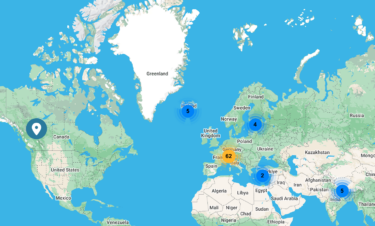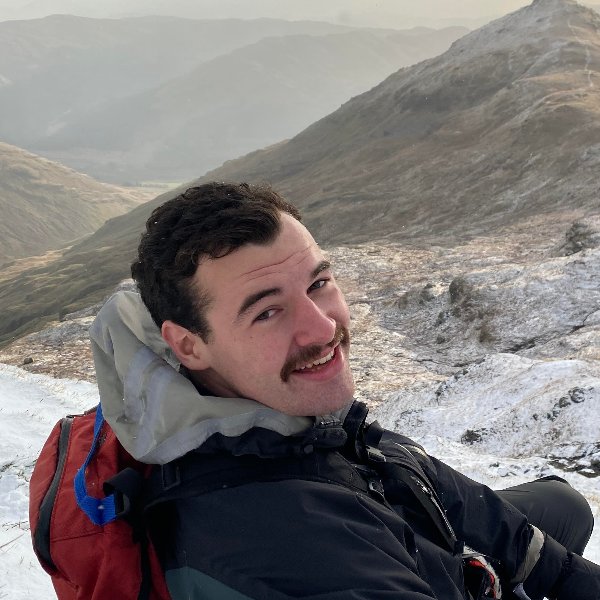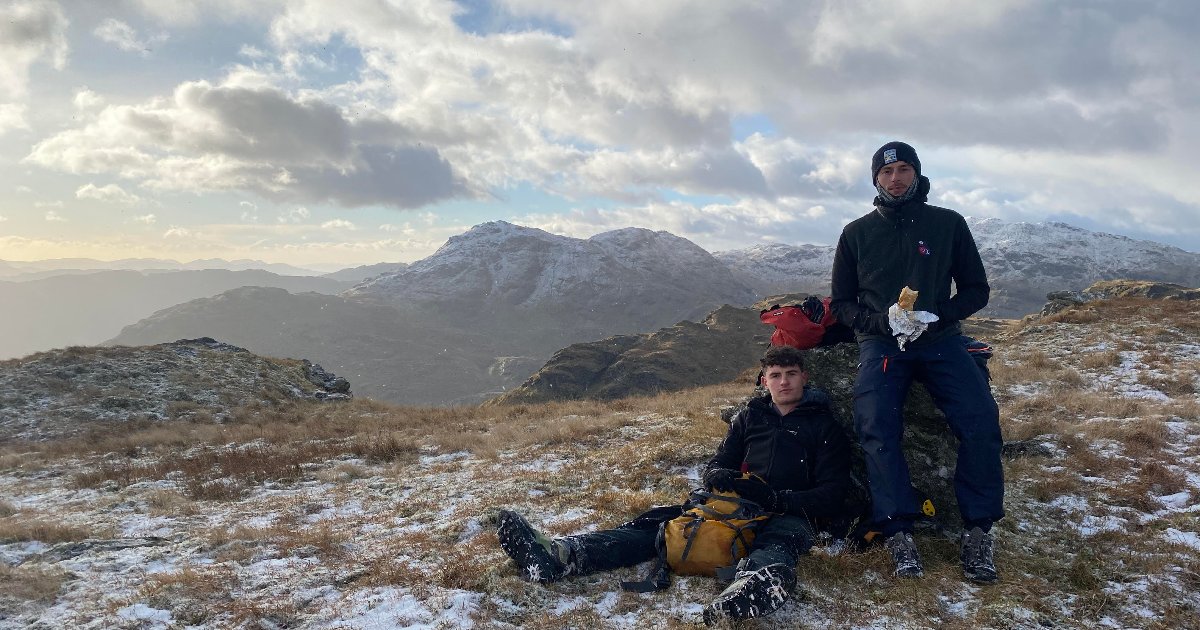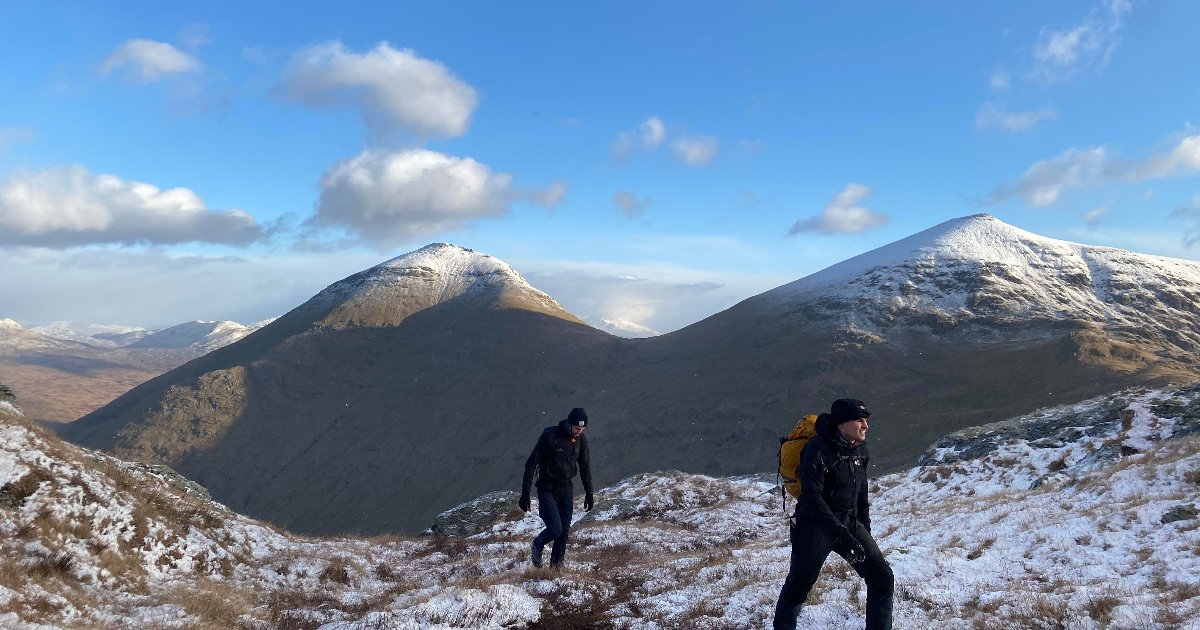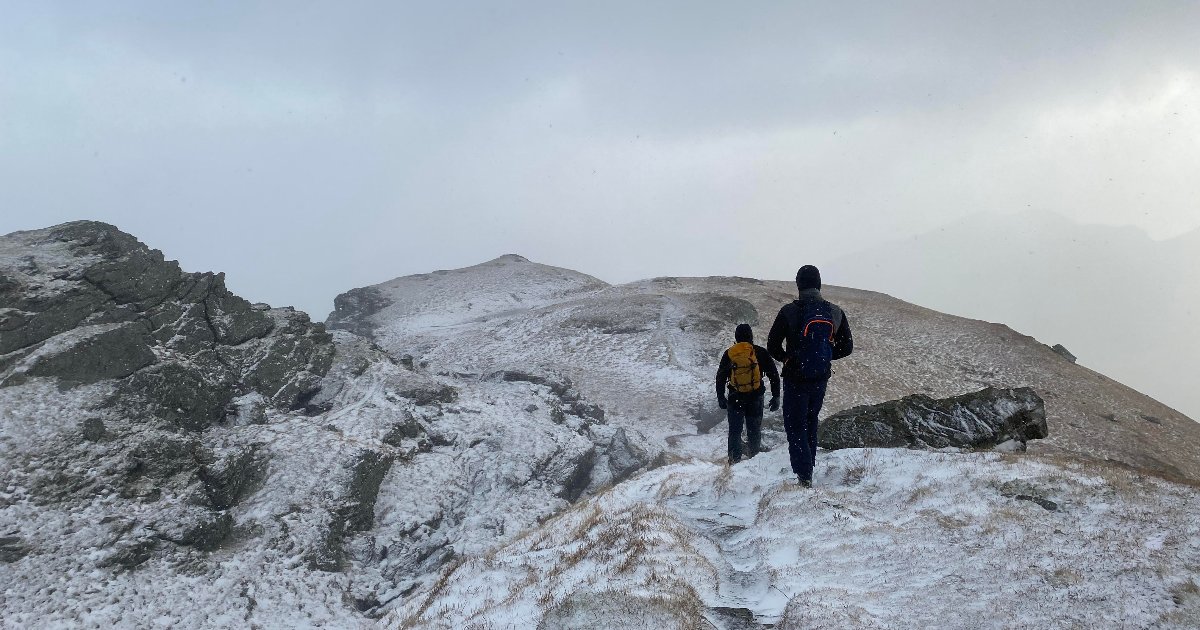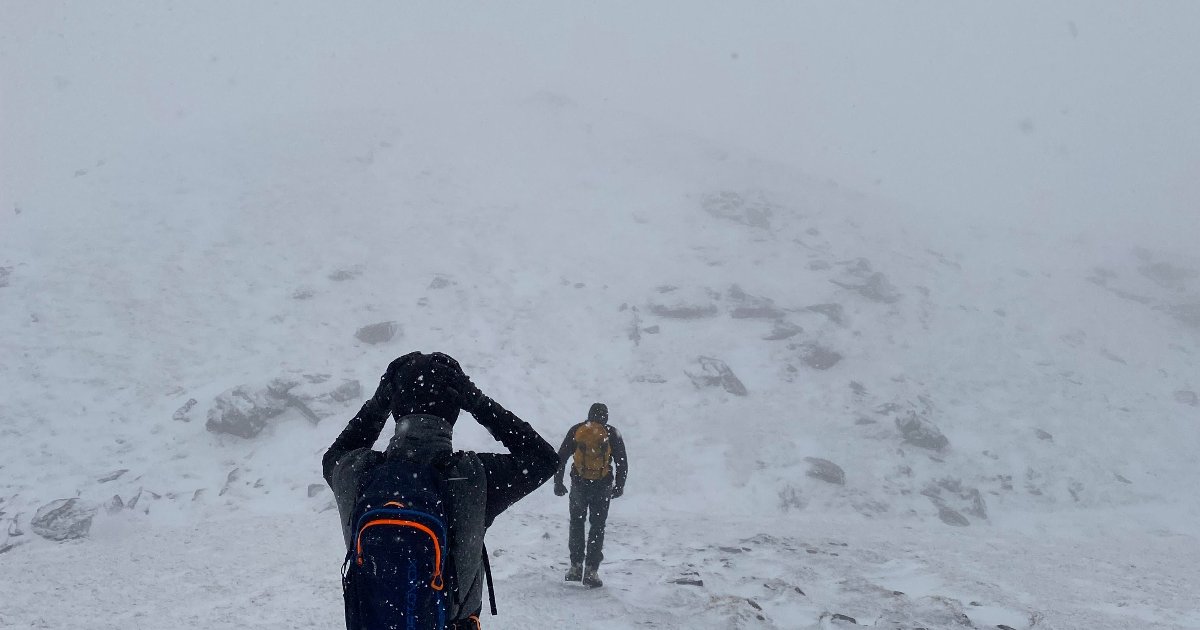It was November. Quite accidentally I had started to read more and more about mountaineering. An off-chance purchase in a Wimbledon charity shop had placed Laura Evans’ The Climb of My Life in my lap. A remarkable story in which Evans details her battle with breast cancer, her triumph over that horrible disease, and the mountains across the world that she conquered before and after cancer. It culminates in Evans’ ultimate victory. A heroic ascent of 23,000-foot-high Mount Aconcagua in the Argentinean Andes along with other survivors that raised innumerable funds for Breast Cancer Research.
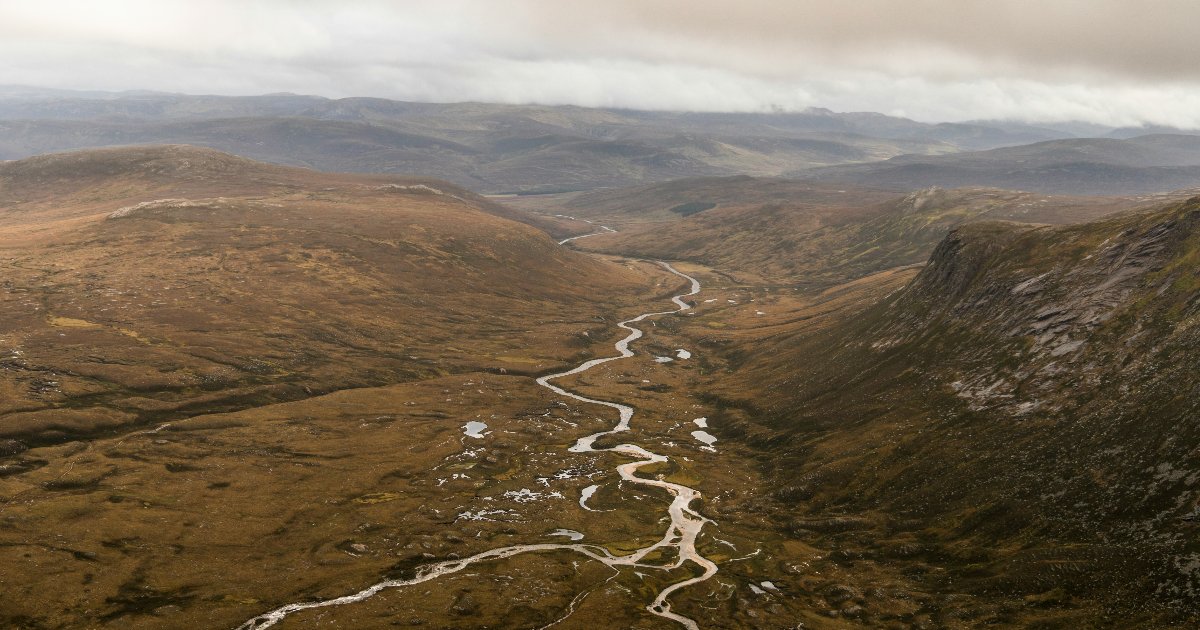
Blog
Bagging My First Munro
Publication date: 12 Jun 2024
The story gripped me.
I wanted to read more about mountaineering. So, I went to Waterstones. There, I came across Ed Caesar’s The Moth and the Mountain. A wild account of Maurice Wilson’s bizarre plan to be the first person to conquer Everest by landing a plane just shy of the summit and hiking the rest from there. The more I read about mountaineering, the more I wanted to climb one myself.
The itch needed to be scratched and I decided I would climb Ben Nevis. It was a strange time to make this decision. It was mid-November, and I was only a couple of months into my masters course with looming deadlines. I didn’t really have the time to be climbing mountains. Not only this, but I had a challenge to complete in November already: grow a moustache and run 150km. This was in aid of the Movember Foundation. So, I tried to reason that Ben Nevis could wait. Yet, the itch remained. The itch became more persistent. And eventually, I rang a couple of friends and said we should do Ben Nevis in a weeks’ time.
I rang two close friends who, by chance, were also good mountaineers – Samir and Angus. They agreed to the idea. Samir was leaving for Switzerland soon (his native home and where he learnt most of his mountaineering) and we thought Ben Nevis would be a good send off. So, it was settled. Gus lived in Scotland on the West Coast. Samir and I would fly up from London, head to Gus’ then drive over to Ben Nevis and bag Britain’s highest peak.
The title of John Steinbeck’s Of Mice and Men comes from a line in the Robert Burns poem To Mouse. The line goes like this: “The best laid schemes o’ mice an’ men / Gang aft a-gley”. In Gaelic, gang aft a-gley means “often go wrong.” Our laid schemes went wrong.
A couple of nights before my flight Angus rang me. He and Samir had privately decided that Ben Nevis was not an option. To them, the route was too boring and would be flooded with tourists. It was more of a hike than a climb, Gus argued. Instead, Gus explained that we would climb Munros that were nearer to him. They’d be tall, have more of an interesting route, and were likely to be devoid of tourists. This didn’t bother me. I didn’t care about the height of the mountain or the path we took up it. I just wanted to climb a mountain. Any mountain.
I flew to Glasgow, met up with Samir and Gus, then we drove west to Loch Earnhead in the late evening. This was where Gus lived with his dad, Alistair. I’ve known Gus most of my life. We went to secondary school, college, and university together. Though his dad remained an elusive figure. All me and Samir knew was that he loved running and had strong political opinions on Scottish independence.
The drive was easy enough. Even in the dark, I could sense the change in country. The shadowed hills rose more and more as Glasgow and the city lights faded behind us. Gus lived in a magnificent cottage. It was old. About 150 years old in fact. Homely, with large cumbersome Victorian furniture in every room. We arrived late on with a car packed full of booze. That seemed to be the only expedition fuel we needed.
Alistair agreed. In fact, he was perhaps too much of an obliging host. Endlessly, he filled our glasses once they were empty. Beer, then wine, then whiskey. I could see his delight as he poured half-pint measures of whisky for all of us. He knew the hangover that awaited us the following day and took a distinct sadist delight in fuelling our future misery.
I think sadist delight is the right expression. Alistair is a runner. A hill runner, a marathon runner, an ultra-distance runner. I had told him about my 150km running challenge. He just laughed and smiled. Then pointed out just last week he had 50km in a single day across multiple Munros. Anyone who puts themselves through that is a sadist, in my eyes at least.
We turned to planning our route. Alistair got out all the Munro books he had, and we began reading our possible paths. I say we; it was mainly Alistair and Angus discussing where they had been previously and what our best options were. There was slight apprehension. The forecast looked terrible. A yellow weather warning had been issued, seventy mile an hour winds, sub zero temperatures, and a great deal of rain with snow on high ground.
With that in mind, Gus decided that we stuck to a route he had done previously and that was nearby. This way, if visibility was poor, he would at least have some sense of where we were heading. The plan was to bag three hills in one day, Stab Grabe (959m), Cruach Ardrain (1046m), and Beinn Tulaichean (946m). This was a circular route and seemed our best option. We took pictures of the directions on our phones and made note of any recommendations. Drunkenly, we clinked our glasses, downed our whisky and haphazardly packed our bags before heading to bed at about midnight.
We awoke before dawn at about five A.M. My room was lit by the still starlit sky, and I could make out the cold hue of my breath. This was a good sign. Light in my room meant a clear sky. A clear sky meant no rain. For now, at least. Hungover, cold, and not yet fully conscious, we forced down some yoghurt and a pastry. The whiskey, still on my breath, was an unwelcomed accoutrement. We stuffed our bags rather haphazardly, performing a mental kit check as we went, then made for the car – fumbling through the night with our head torches.
The drive from Loch Earnhead was a quick one. In a small part, this was due to the relatively short distance. In a much larger part, this was due to Angus’ rally car driving philosophy. He reasoned (quite successfully) that no cars would be on the road this early and no one would be heading out to our location. We bumped, screeched, drifted – often flew – along the winding country roads. The night was that distinct midnight blue, and the car’s headlights cut through the dark effortlessly. All the way, a loch accompanied us for the journey. Too close a companion for my liking. The loch was less than a metre away from the road for the whole journey, if not closer for some parts. I couldn’t make out her distinct features, but she followed us along, silently glowing in the quiet of the dark.
Beside the loch, as we meandered and contorted in unison with the loch, sat countless Munros. They sloped and rose on either side of the car. I knew there were many of them. I could see the distinct ridges and Glens on each and everyone. Yet, in the morning night, they remained in their black silhouette form. Rising and falling, rising and falling, a huge curling and shifting shadow. Perhaps I was still drunk. Perhaps I was struck by their size, even in the night. Perhaps both. Even so, to me at least, these black hills looked like one giant slumbering snake. Some huge prehistoric beast quietly sliding along in the night.
We were still drunk. Morale was incredibly high for how little sleep we had had. Constantly, we joked about a pub sitting atop the mountain. A huge pub, with roaring fires, full of Scandinavian blondes. Samir put on the Artic Monkeys and Gus happily obliged the car’s rhythm to go in tow. The sky remained clear and soon enough we arrived at an empty car park. Some clouds had formed now, but the stars still crept through. I was tired. The alcohol was fading and the realisation of what was to come started to slowly settle in. Forcing myself out of the small of the car (and it was very small), I felt sick. In fact, I threw up in my mouth. Samir threw up on the floor. The cocktail of dairy, lager, and whiskey, had been thoroughly shaken and stirred by Angus’ driving and found its rightful place on the car park floor. We laughed it off, took a picture of our jolly faces, and began walking.
This first stint of the hike was easy enough. A path to follow, very little incline, and calm – blissfully calm weather. We walked about a mile and the path gradually evaporated. In its place, marshland sprouted up from the stone earth. Boggy, sopping wet, marshland. With every step it felt as if some tiny army beneath the soil was trying to pull you down. We squelched our way onwards with a gradual incline. The sun was just starting to come up and we were in the heart of the Glen now.
Behind us, I could make the faint tip of the morning sun creeping over a distant Munro. The sky around us shifted from black to the light white blue of the morning. Above, a Golden Eagle sauntered in the air. The long broad wings outstretched as it began to glide down to its nest. All was quiet and still. Churchill is supposed to have once said “When the eagles are silent, the parrots begin to jabber.” We were very much the parrots.
By now, I could make out our first hill – Stab Garbe (959m). Behind it, higher still sat our other two summits. The question was how to go up. Here, the jabbering began. Angus insisted he had done the route before and that we bag a left, take a steep incline, and head on up. This was different from the route he had previously taken and offered what Angus described as more “adventure.” Samir and I, rather cautiously, questioned this. Looking at the notes from the book, Samir pointed out that the guide suggested we avoid this steep incline and follow the back of Glen, gradually making our way to the top. This seemed sensible. This was, after all, the recommended route. But it was unpalatable to Gus.
So, it was settled and up we went. There’s a knack to walking up mountains it turns out. You walk in a zigzag almost serpentine fashion with a methodical stride and paced breathing. This way, the direct line of ascent is broken up and the gradient you experience is reduced. Gus and Samir, both veteran climbers, managed this with relative ease. A few strides, measured breath, turn and zigzag up. I followed in tow. Sluggishly, unflatteringly, with fast breath and clumsily clenching grass to pull myself up.
Heights have never bothered me. I’ve done bungee jumps, those silly trust falling exercises at work retreats from a tall pole, and been up relatively big hills and mountains. Yet, halfway up Stub Grabe, I experienced that well known phenomenon of ‘dizzying heights.’ It seemed silly then and now, that these formidable hills, so solidly entrenched in the Earth with no movement at all, can cause you to feel dizzy. But dizzy is certainly the right word. My stomach contorted (in part because of the hangover) and my mind spun in a hurried rush of thoughts. The stupid thing was that I couldn’t even fall from where I was. I could slip, maybe slide a few meters downhill, but I’d be fine. But, the wheel was now turning. Fast. There was no time for clarity, just a confusion of dizzying thoughts that I was going to fall, that I was incredibly high up (I wasn’t), and no one was around to treat my imminent injuries.
I panicked. And, in dazed determination, somehow reached the conclusion that the best thing to do was sprint to the top. So, on all fours, I frantically – hilariously – began bear crawling ahead of Gus and Samir. I galloped a few meters upwards, clawing at whatever I could, hugging the mountain as I went. Then, I would stop exhausted, raise a thumbs up to Gus and Samir, catch my breath and trot further up. I repeated this process several times. It wasn’t pretty, nor effective, but I was moving. Gus and Samir stared with bemusement, quietly making their way up with a patient stride.
We took a seat at the top of the hill for a lunch break. I had calmed at this point and my apparent mania had settled. We snuck between a collection of rocks to escape the now blistering wind. Gus rolled a cigarette and Samir polished off a sandwich.
Gus, taking a long drag of his cigarette, pointed downwards to the base of the hill. There we saw a fox. It doted its away along the boggy green grass with ease. It was big, by fox standards at least, and had a magnificent orange coat. I had never seen a fox quite like it. It moved effortlessly and disappeared around the back of the Glen just as quickly as it had come.
We sat there for a while. Gus smoking, Samir still eating, all of us fatigued. We’d put some distance between ourselves and our hangovers. The sky remained clear to the back of us. Up ahead I could make out rain clouds rolling in across the hills. Just opposite the valley sat the mighty Ben More with snow petering down and drifting across its ridge. It astonished me really. In this small basin I could see all four seasons swirling around in contention with one another. As if they were all vying for centre stage. Fortunately, we were an audience to a wintery spring. Clear sky and strong winds. Samir reasoned the rain would blow past or break up before it reached us. So, we pressed on.
The terrain changed now. Increasingly, snow began to dominate the landscape. It was colder, but the snow made for much easier walking. I followed in Samir’s footsteps, literally. And paced my breathing meticulously. It was far more efficient than a bear crawl – surprise. We didn’t say much for a while. Just ploughed along in silence, focusing on our stride and breath. My legs burned and my calves were starting to cramp. Then we were over the ridge.
The north face of Cruach Ardrain looked at us flatly. It was a sharp incline; too sharp to climb without crampons. Plus, we only had one ice axe between us (that’s packing while drunk for you!). My stomach churned and my intestine started to tie itself up in knots. I could feel them. Solid lumps pitted in my stomach. This time I knew my fear was warranted. I could see snowdrifts blowing off the rocks and ice shimmering in the broad sun. It was foolish to try and go up. Still, Gus and Samir, always erring on the wrong side of caution, eagerly pondered whether we could attempt an ascent. I, however, knew that no matter what happened – I wasn’t going up that summit. At least not via that route.
I could see the desperation in their eyes. Like adults negotiating with their children, Gus and Samir offered me false promises to lure me up the route: “We can make a start and turn back if its really bad.” “Plus, it won’t be that bad.” “You keep the ice axe and we’ll be fine.” The truth is, we were quite high up in the middle of nowhere without phone service or radio. If any of us got injured, even in a small way, it was some walk back down with no one coming to rescue it. If someone got injured in a big way, well, the less said the better. Eventually, we agreed to go up via the west face. Take a small dip under some cliffs and come back up around the other side of Cruach Ardrain.
It was at this point I really did begin to question why we were climbing up these hills in the first place. Not because I wasn’t enjoying the experience. Quite the opposite, in fact. I felt good. Happy in the struggle and that strange feeling of solidarity as we scrambled further up. I liked the air and the cold. The vastness that was all around me. I was in motion for the sake of being in motion. And that was good enough for me. I was well aware of this transitory state. This pleasant feeling that accompanied me up the mountain and would leave me as I came down. Maybe I was climbing for that exact sensation. Or maybe that sensation was the by-product of why I was climbing. But why was I?
I don’t know. And I don’t think there is much philosophical merit in trying to figure out why either. George Mallory was a British mountaineer and a leading figure in the earliest attempts to try and conquer Everest. Asked why he wanted to climb Everest in the first place; Mallory coolly replied, “Because it’s there.” Now, Cruach Ardrain is ever so slightly different to Mount Everest (by 7803 meters to be exact), but I do find Mallory’s answer to be revealing.
I have a humanities structured brain. Throughout my life I’ve always gravitated towards the arts over science. Science, in my eyes at least, seeks to explain the how’s of the world. How the Earth orbits the sun, how climate change is killing our planet, and so on. Whereas the arts deal with the whys of the world. In my experience, it seems that every humanities subject, history, English literature, sociology, etc. are all trying to explain why people do what they do. More often than not, there’s some convenient catchall motivation that explains someone’s actions in one fell swoop: Freudian analysis, capital accumulation, religious vigour, the self asserting the self.
Yet, Mallory’s sentiment of “Because it’s there” seems the most obvious to me. That was why I was climbing these hills. Why I had flew up here and came all this way. Simply because I could and Cruach Adrain was there. That strikes a chord with me. If I ever ask my old man why he’s doing something, anything even, the answer is always the same: “Because I can.” Not because the ego and ID are making him do it, not because Veblen’s theory of conspicuous consumption is driving his every move, simply because he can.
That was why I was climbing these hills: because I can.
We curved around under the cliffs to the West of Ardrain’s summit. The ascent was steep, but much easier than the boggy climb of Stub Grabe. Again, measured breathing and a methodical stride. Again, we stopped short just off the final ridge and looked down at how far we come. Again, Angus lit up a cigarette. It was here Samir snapped a good photo of me. Snow clouds to my right, brilliant blue skies, and the mid-afternoon sun to my left. Beinn Tulaichean sits idly behind me with hills rolling on for miles into the distance. I found it hard to believe we were in the UK. It was as if we’d been transported to the Himalayas. There’s a uniqueness to the landscape in Scotland. Particularly here.
Then, the final push. Up and over the ridge and straight onto the summit. The ground was snowy with a mix of ice dotted in between. I could only make out Angus in front of me. Samir was too far ahead. Or maybe he wasn’t. It was impossible to tell. I could only see a meter in front now. All around was white and the wind blew relentlessly. The harshest it had been all day. Snow stuck to my eyelashes, my hideous moustache, and anything else it’s frosted hooks could cling to. Out of the white, Samir suddenly emerged. Sat down in front of a rock taking a beating by the wind. Me and Gus joined him, drinking water, and rubbing the snow out of our eyes. It was hard to get your breath back as the wind simply would not give up. We were elated, but there wasn’t much conversation to be had about it.
Instead, I pulled out the Middlesbrough FC promotion flag from the 2015-2016 season out of my pocket. A gift from my sister when I went to university. Biting one corner and pulling the other with my gloved hand, we laughed. Alistair hated this kind of thing. We were climbing some local Munros, not Kilimanjaro. I put the flag away and Gus took a compass reading. We cautiously made our way down, staying true to our course and gradually coming out of the white that surrounded us.
Eventually, we came to the path that led to Beinn Tulaichean. It was smooth sailing from here on out. A short walk from one summit to the next. The worst of it was behind us and all that remained was a small hill and the descent. Another sandwich and cigarette break midway between the two peaks, then over the hill and down.
The walk up Beinn Tulaichean was the easiest of the day. Yet, my calves really started to burn at this point. I had a feeling a month’s worth of novice running was catching up with me. I had bought a copy of Murakami’s What I Talk About When I Talk About Running for the flight. He is a phenomenal author. It seemed the right thing to do. To read someone talk about running. I hoped to find some tips on running or find a language to the experience I did not yet have words for. I found all I sought and then some. Unlike Murakami, I won’t talk much about running since this is supposed to be about my experience of climbing a mountain. That said, my experience of climbing these hills was deeply entwined with running.
I had ran a total 132km in 26 days at this point. An average of about 5km a day. Prior to November, I didn’t run at all. If I did, it was only playing sports like rugby or football. I never ran for the sake of just running. It seemed odd to me. Running seemed a thankless task in a way. It’s not the same as running on the pitch where you’re running for your teammates. Instead, you’re just running for yourself. I needed competition to run. To run to the next ruck, to the next phase of play, or to outrun the man chasing me. I guess that’s why I chose running as my challenge. It was something new and difficult to do.
It was difficult. Initially, I struggled to run five kilometres in one sitting. I did though, eventually. It took me over half an hour, and I was gasping for air by the end of it. Gradually, quite unknowingly really, it got easier. After a couple weeks I was comfortably running 7km. Now I can do a 10km with little hassle. I’m not showing off here. My times are certainly nothing to brag about. Rather, I was just shocked at how quickly the body can adapt to the demands it’s put under. But there is a price to these demands.
Point being, after all this running my calves were unbearably tight, and I was struggling with the descent. Every step down the Earth reverberated up my leg. I felt as though the knots in my calves were not about to unravel, but rather snap ferociously having been stretched to their limits.
It was here I thought of Murakami. There’s a wonderful metaphor he returns to throughout the book. This idea of “untouched dormant veins within” himself or natural springs within that he has to tend to. These springs and veins are Murakami’s life force. The energy that sustains him as a runner and as a writer.
I sympathise with Murakami’s sentiment. But the idea of a spring, or a vein, or some natural resource to tap into doesn’t sit right with me. For me at least, this potential within is far more volatile. Far more dangerous, even. It’s as if there is an incredibly potent substance deep within me that fuels my body and mind. But I struggle in gauging how much I need, how long I need to burn it for, and most importantly how to go about extracting it in the first place. Sometimes it’s as if the fuel ignites on its own. And, for a brief time, I burn brilliantly and intensely at a given task. Then, at other times, it sits idly in the tank. I can’t get the engine to start no matter what I do and I become incredibly frustrated at the inertia of my will. Then, in some peculiar time, I burn steadily, with a monotonous focus that endures. Perhaps it is my age and I need more time to figure out the conditions in which to harness this fuel.
Yet, what scares me most of all is that once I complete my task, when it’s all said and done, if even one small ounce of fuel remains – it turns toxic, rancid, and corrodes away at me within. I sometimes wonder if this a fault of my engine, rather than the fuel per se. I wonder if in other people’s hearts this small bit of overspill can remain in the tank and be used on the next drive. I know it can’t for me. It just sits there at the bottom. Burning away with resentment, as if insulted it wasn’t needed. Then it insults me. Those last few drops sit within and ask, why didn’t you use me? Why didn’t you give me your all? These thoughts last as long as the tank will hold them. Doubt persists, but eventually the fuel – now corrosive – burns a hole and escapes into my body. Dissipating into a drift of confusion and guilt.
Therein lies my paradox. I need to use all of my fuel all of the time. I can’t keep reserves. I can’t stockpile and save it when I need it most. I need my foot on the peddle, constantly. If I let up, the fuel turns sour and those nagging questions of why aren’t we moving? Why aren’t you using me? resurface. But even if I do have my foot on the pedal – firmly even – I must use all the fuel. And I mean all of it. It’s a strange thing. But the more I think about it, the more I realise that I find relief in exhaustion.
I can’t put it into words. I don’t think a cheap metaphor about fuel captures what I mean either, and I’ve rambled on about it long enough. But I think Edna St. Vincent Millay’s poem I comes pretty close to what I’m trying to say:
My candle burns at both ends;
It will not last the night;
But ah, my foes, and oh, my friends –
It gives a lovely light!
Candles do give a lovely light. I should know.
My calves held out and we completed the descent easily enough. Along the way two young does appeared from seemingly nowhere. They kept their distance but watched with curiously. In fact, they watched us all the way down. Just as we were leaving the Glen I looked back and saw them stood atop the hill. Two custodians of their quiet valley.
We piled back into the car and made for home. Alistair greeted us merrily and mocked our time. It turns out we spent nearly two hours taking breaks along the way. An hour passed, then the power went out. Not just for us, but across most of Scotland and Northern England. At the time of writing, six days after our hike, Gus’ place is still without power. Storm Arwen’s wrath had affected the whole country.
So, there we were. Sat in the cold dark of the house. We hoarded together what candles we could find, fed the fire, and took a seat at the table in front of that lovely light. We ate cheese, drank beer, then wine, then whiskey. Alistair joined us too. He took a seat in the corner of the room, just beside the fire. I could hardly make him out, save the glow of the flames.
We talked for hours. About the hike, about my foolish bear crawl, my fear and rookie apprehension, then University and the shared memories that bound us together. Every once in a while, Alistair quietly teased answers out of us by asking questions about our future. What career we wanted, what we were doing now, what we were doing next. None of us really had an answer. That’s the bliss and pain of being in your mid-twenties. The whole world in front of you. The chance to do anything to be anything, and no idea what to do or be.
I say that, we all could feel the big currents of life sweeping us away. Samir was returning to Switzerland for a year doing odd jobs and skiing. Gus was looking for a job, any grad job he could find to get out of Loch Earnhead. And I was back off to London to finish a masters with little idea what awaited me after that. Like much of that night, as we fumbled about in the dark in search of socks, beer and firewood, we were fumbling forward to our futures. In a way, I think Alistair was asking questions to offer a glimmer of light, maybe. As if to illuminate something up ahead and signpost something in the dark we didn’t know existed. Or at least, make us consider it. Or maybe not. He might have just been curious about our lives. We were sure enough curious about his. Maybe he was just revelling in the unknown future of youth.
We were certainly jolly in the unknown. There’s a line in Moby Dick where faced with an unknown journey ahead as Ahab pursues the white whale, Stubb says “I know not all that may be coming, but be it what it will, I’ll go to it laughing.” I think that was our shared philosophy.
By this point, Alistair had heard enough of our drunken aspirations. He got out of the chair and headed outside, then called for us to follow. Quite calmly, he simply pointed up. I’ve never seen a night sky like it. Without the hassle of light pollution, the sky lit up to its full potential. I often wondered why it gets called the Milky Way, but now I could see why. Between the countless stars these magnificent long white whisps floated between the studded sky. Like the steamed milk that goes into coffee. We stood there for a while. In the cold. Silent at what was above. Silent just like the sky. Nothing needed to be said, I suppose.
Alistair said goodnight in Gaelic and dipped into the house. We said it back in turn with butchered pronunciation, me and Samir at least. After a while, we went to bed. I slept fully clothed again in the cold room feeling, at last, satisfied. I awoke much like the previous morning. My breath visible before me, full of whiskey, and cold. We had breakfast. Square sausage, black pudding, bacon, fried eggs, and fried bread. If there was fruit to be had, I’m certain Angus would have fried that too.
The power was still out and we had no idea what was happening outside of this small hamlet we found ourselves in. We could have been invaded, another lockdown could have been enforced, anything really, we’d have been none the wiser. We finished up breakfast and took a walk around the loch. It was a nice crisp autumn day and the water was calm.
After the walk we thanked Alistair for his hospitality and made for Glasgow. I think he seemed quite content sat in that powerless house. No one to bother him as he read by the fire. We made for Glasgow. It was an interesting journey. We still had no service and the car was dangerously short of fuel when we left Loch Earnhead. Gus reassured us that a petrol station was nearby. Yet, when we arrived, the station was closed. It was the power cut. The pumps ran off the main grid. We made a judgment call and reasoned there was just enough in the tank to get us to the next station. The word ‘just’ can be thrown about fairly loosely in everyday use. But when I say there was just enough in the tank to make it to the next station, I mean it with painful accuracy.
The car cut out exactly as we arrived as we pulled up to the petrol pump. Fortunately, this station had its own generator, and we were able to stock up. Fuel in the tank, on we went. Once in the city we spent most the weekend falling (mainly falling) in and out of pubs. We were staying at Gus’ brother’s (Murdo) place. Gus failed to mention that the house was a three-bedroom student flat with four students already living it. We were also delighted to discover that the window in the room we were staying wouldn’t close. So, there we were, me, Gus, Samir and Murdo, all four of us all sharing a room anyway we could. Sprawled out on chairs and bean bags, fully clothed, trying to sleep as the wind blew through.
Too much happened in Glasgow to detail here. But it was a good weekend and passed too quickly. We all parted ways. The flight back to London was easy enough. I returned to my Uncle’s and Auntie’s house where I was staying with a few stories to tell. Well, more than a few.


